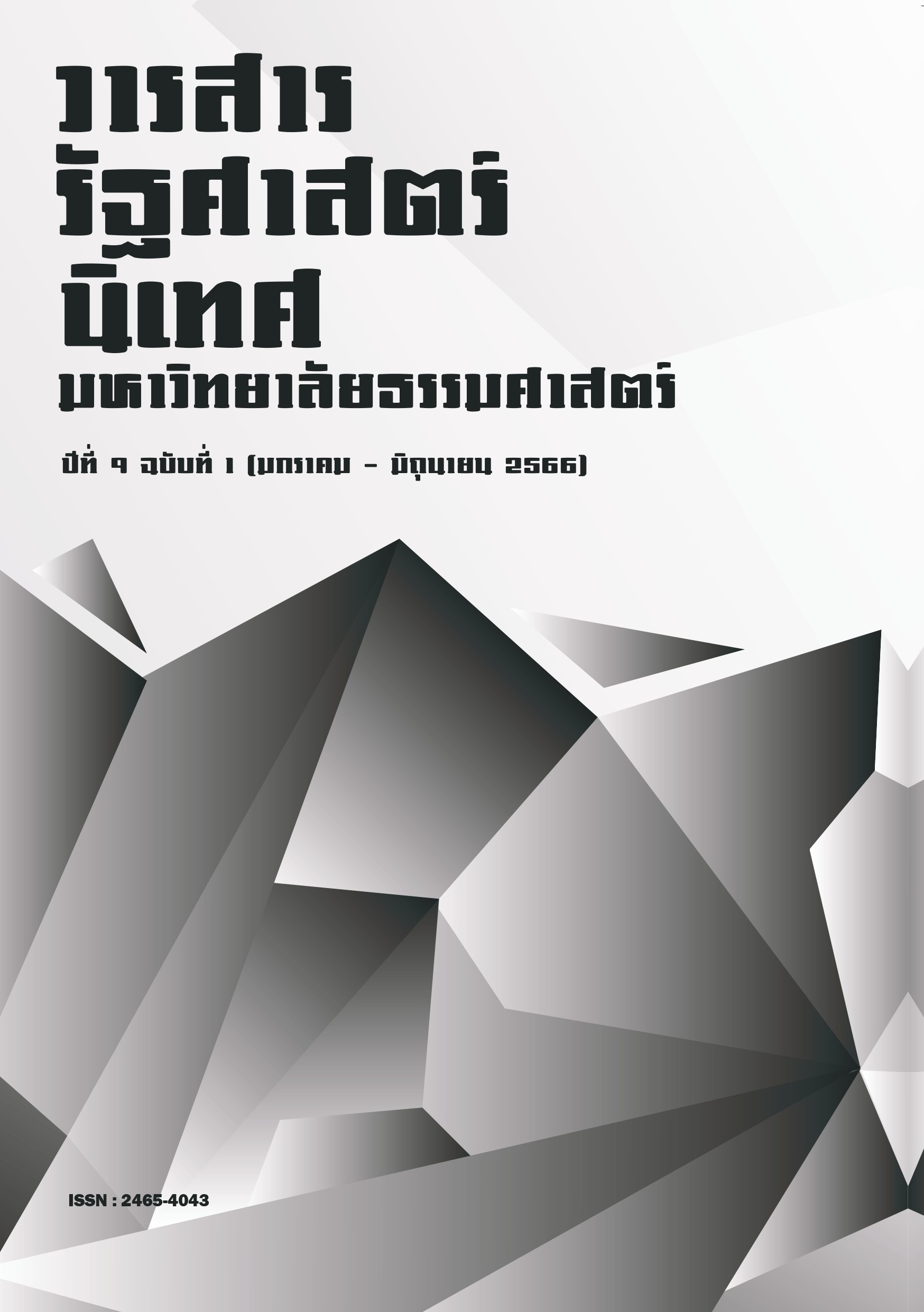เผด็จการอยู่ยั้งยืนยง: สถาบันประชาธิปไตยในฐานะเครื่องมืออันทรงพลังของระบอบอำนาจนิยมแบบแข่งขันในประเทศไทย
Main Article Content
บทคัดย่อ
สถาบันการเมืองประชาธิปไตยส่งผลต่อระบอบอำนาจนิยมแบบแข่งขันอย่างไร? งานศึกษาจำนวนหนึ่งในกลุ่มแนวคิดการทำให้อำนาจนิยมตั้งมั่น อธิบายว่า สถาบันประชาธิปไตยภายใต้ระบอบเผด็จการที่ส่งเสริมการมีส่วนร่วมและระบบตัวแทนส่งผลเชิงลบต่อการเปลี่ยนผ่านไปสู่ประชาธิปไตย ผู้นำอำนาจนิยมจำนวนมากไม่เพียงอยู่รอด แต่ยังมีอำนาจเข้มแข็งยิ่งกว่าเก่าและมีพันมิตรสนับสนุนระบอบมากกว่าเดิม อย่างไรก็ตาม กลไกและยุทธศาสตร์ที่รัฐบาลอำนาจนิยมใช้จัดการทางการเมืองภายใต้สถาบันประชาธิปไตยด้วยวิถีปฏิบัติที่ซับซ้อนยังไม่ค่อยได้รับการอธิบายอย่างเป็นระบบมากนัก บทความนี้นำเสนอข้อถกเถียงว่าการเลือกตั้งภายใต้ระบอบอำนาจนิยมเป็นห้วงจังหวะซึ่งพื้นที่ทางการเมืองเปิดให้ตัวแสดงทางการเมืองต่างๆ เผยตัวขึ้นอย่างเด่นชัด รัฐบาลอำนาจนิยมจึงสามารถเกณฑ์ตัวแสดงเหล่านั้นเข้ามาเป็นพวกผ่านการแจกจ่ายรางวัลทางการเมืองและการผ่อนปรนทางนโยบาย อันนำไปสู่การกระชับอำนาจภายหลังการเลือกตั้งในที่สุด เพื่อที่จะประเมินข้อถกเถียงข้างต้น บทความนี้จึงใช้การเลือกตั้งทั่วไปปี 2562 ในประเทศไทยเป็นกรณีศึกษา โดยศึกษาผ่านปฏิสัมพันธ์ของตัวแสดงทั้งก่อนและหลังการเลือกตั้ง ข้อค้นพบของงานชิ้นนี้ช่วยเน้นย้ำคำอธิบายที่ปรากฏอยู่ในกลุ่มแนวคิดว่าด้วยการทำให้อำนาจนิยมตั้งมั่น
Article Details

อนุญาตภายใต้เงื่อนไข Creative Commons Attribution-NonCommercial-NoDerivatives 4.0 International License.
เอกสารอ้างอิง
ภาษาไทย
คมชัดลึก, https://www.komchadluek.net/news/523470, (สืบค้นเมื่อ 23 ธันวาคม 2565).
คมชัดลึก, https://www.komchadluek.net/scoop/352831, (สืบค้นเมื่อ 21 ธันวาคม 2565).
จักรวาล ส่าเหล่ทู. “หลากมุมมองนักวิชาการ ระบบเลือกตั้ง 'จัดสรรปันส่วนผสม'.” คมชัดลึก (เว็บไซต์), https://www.komchadluek.net/news/216260, (สืบค้นเมื่อ 20 ธันวาคม 2565).
ฐานเศรษฐกิจ, https://www.thansettakij.com/politics/397115, (สืบค้นเมื่อ 22 ธันวาคม 2565).
ฐิติกร สังข์แก้ว, สราวุธ ทับทอง, และอรรถสิทธิ์ พานแก้ว. “ระบบจัดสรรปันส่วนผสม.” ใน จุด (ไม่) จบ: ช่วงฉากการเมืองไทย 2548 - 2559 (กรุงเทพฯ: สถาบันพระปกเกล้า, 2559), 415-424.
ไทยรัฐ, https://www.komchadluek.net/news/politics/539288, (สืบค้นเมื่อ 25 ธันวาคม 2565).
ไทยรัฐ, https://www.thairath.co.th/news/politic/687001, (สืบค้นเมื่อ 20 ธันวาคม 2565).
เนชั่นออนไลน์, https://www.nationtv.tv/news/378863417, (สืบค้นเมื่อ 22 ธันวาคม 2565).
“ประกาศกระทรวงสาธารณสุข เรื่อง ระบุชื่อยาเสพติดให้โทษในประเภท 5.” ราชกิจจานุเบกษา. เล่ม 139 ตอนพิเศษ 35ง, 9 กุมภาพันธ์ 2565, 1.
“ประกาศแต่งตั้งรัฐมนตรี.” ราชกิจจานุเบกษา. เล่ม 136 ตอนพิเศษ 176, 10 กรกฎาคม 2562, 1-3.
โพสต์ทูเดย์, https://www.posttoday.com/politics/591177, (สืบค้นเมื่อ 24 ธันวาคม 2565).
มติชน, “อาฟเตอร์ช็อกการเมือง หลังยุบพรรค ‘ไทยรักษาชาติ’.” (เว็บไซต์), https://www.matichon.co.th/politics/politics-in-depth/news_1398079, (สืบค้นเมื่อ 22 ธันวาคม 2565).
มติชน, https://www.matichon.co.th/politics/news_1659853, (สืบค้นเมื่อ 23 ธันวาคม 2565).
มติชน, https://www.matichon.co.th/politics/news_3725168, (สืบค้นเมื่อ 24 ธันวาคม 2565).
มติชน, https://www.matichon.co.th/politics/news_863658, (สืบค้นเมื่อ 21 ธันวาคม 2565).
“รัฐธรรมนูญแห่งราชอาณาจักรไทย พ.ศ. 2560.” ราชกิจจานุเบกษา. เล่ม 134 ตอนที่ 40 ก, 6 เมษายน 2560, 1-90.
รัฐสภาไทย. “ร่างรัฐธรรมนูญแห่งราชอาณาจักรไทย แก้ไขเพิ่มเติม (ฉบับที่ ..) พ.ศ. .....” (เว็บไซต์), https://www.parliament.go.th/ewtadmin/ewt/parliament_parcy/more_news.php?cid=4943, (สืบค้นเมื่อ 24 ธันวาคม 2565).
สำนักงานคณะกรรมการการเลือกตั้ง. ข้อมูลสถิติการเลือกตั้งสภาผู้แทนราษฎร พ.ศ. 2562 (กรุงเทพฯ: สำนักงานคณะกรรมการการเลือกตั้ง, 2563).
สำนักเลขาธิการนายกรัฐมนตรี. “คำสั่งแต่งตั้งข้าราชการการเมือง รัฐบาล พลเอก ประยุทธ์ จันทร์โอชา.” (เว็บไซต์), https://www.soc.go.th/?page_id=538, (สืบค้นเมื่อ 22 ธันวาคม 2565).
สิริพรรณ นกสวน สวัสดี. “ทางเลือกระบบเลือกตั้งในห้วงเวลาแห่งความโกลาหล.” วารสารรัฐศาสตร์และรัฐประศาสนศาสตร์, ปีที่ 13, ฉบับที่ 2, 1-34.
หทัยกาญจน์ ตรีสุวรรณ. “แก้รัฐธรรมนูญ: รัฐสภาให้กลับไปใช้บัตรเลือกตั้งสองใบ 149 ส.ว. โหวตเห็นชอบร่างแก้ไขรัฐธรรมนูญวาระ 3.” BBC (เว็บไซต์), https://www.bbc.com/thai/thailand-58510872, (สืบค้นเมื่อ 24 ธันวาคม 2565).
หทัยกาญจน์ ตรีสุวรรณ. “เลือกตั้ง 2562: เพื่อไทย-ประชาธิปัตย์ เผชิญอดีตส.ส. แหกค่าย-ย้ายพรรคนับร้อย.” BBC (เว็บไซต์), https://www.bbc.com/thai/thailand-46353749, (สืบค้นเมื่อ 21 ธันวาคม 2565).
BBC, https://www.bbc.com/thai/thailand-47692906, (สืบค้นเมื่อ 19 ธันวาคม 2565).
BBC, https://www.bbc.com/thai/thailand-48421196, (สืบค้นเมื่อ 24 ธันวาคม 2565).
BBC, https://www.bbc.com/thai/thailand-48891690, (สืบค้นเมื่อ 22 ธันวาคม 2565).
iLaw. “8 ปี คสช. สภาแต่งตั้งเลือกสรรคนไปเป็น “องค์กรตรวจสอบ”.” (เว็บไซต์), https://ilaw.or.th/node/6157, (สืบค้นเมื่อ 20 ธันวาคม 2565).
iLaw. “ใครเป็นใครใน ส.ส.เขต พลังประชารัฐ.” (เว็บไซต์), https://ilaw.or.th/node/5277, (สืบค้นเมื่อ 21 ธันวาคม 2565).
iLaw. “สรุปข้อเสนอ 13 ร่าง สำหรับติดตาม #แก้รัฐธรรมนูญ ภาคสอง.” (เว็บไซต์), https://ilaw.or.th/node/5889, (สืบค้นเมื่อ 24 ธันวาคม 2565).
PPTV, https://www.pptvhd36.com/news/การเมือง/177018, (สืบค้นเมื่อ 3 มกราคม 2566).
ThaiPBS, https://www.thaipbs.or.th/news/content/311354, (สืบค้นเมื่อ 3 มกราคม 2566).
The Standard. “นาทีชุลมุน วิสาร เตชะธีราวัฒน์ ส.ส. เพื่อไทย ตะโกนกลางสภา นายกฯ แจกเงิน 5 ล้านบาทให้ ส.ส.” YouTube (วิดีโอ), https://youtu.be/SWflp3bXybQ, (สืบค้นเมื่อ 23 ธันวาคม 2565).
Workpoint Today, https://workpointtoday.com/votepm62/, (สืบค้นเมื่อ 19 ธันวาคม 2565).
Workpoint Today. “เลือกตั้ง 62 | ย้อนดูนโยบาย 3 พรรคหลักร่วมรัฐบาล.” (เว็บไซต์), https://workpointtoday.com/news190607/, (สืบค้นเมื่อ 22 ธันวาคม 2565).
ภาษาอังกฤษ
Boese, Vanessa A., Nazifa Alizada, Martin Lundstedt, Kelly Morrison, Natalia Natsika, Yuko Sato, Hugo Tai, and Staffan I. Lindberg. Autocratization Changing Nature? Democracy Report 2022 (Gothenburg: Varieties of Democracy Institute (V-Dem), 2022).
Boix, Carles and Milan W. Svolik. “The Foundations of Limited Authoritarian Government: Institutions, Commitment, and Power-Sharing in Dictatorships.” The Journal of Politics. Vol. 75, No. 2 (2008): 300-316.
Bratton, Michael and Nicolas van de Walle. Democratic Experiments in Africa Regime Transitions in Comparative Perspective (New York: Cambridge University Press, 1997).
Bunce, Valerie J. and Sharon l. Wolchik. “Defeating Dictators: Electoral Change and Stability in Competitive Authoritarian Regimes.” World Politics. Vol. 62, No. 1 (2010), 43-86.
Diamond, Larry. “Thinking About Hybrid Regimes.” Journal of Democracy. Vol. 13, No, 2 (2002): 21-35.
Gandhi, Jennifer and Adam Przeworski. “Authoritarian Institutions and the Survival of Autocrats.” Comparative Political Studies. Vol. 40, No. 11 (2007), 1279-1301.
Gandhi, Jennifer and Ellen Lust-Okar. “Elections Under Authoritarianism.” Annual Review of Political Science, Vol. 12 (2009), 403-422.
Gandhi, Jennifer. Political Institutions under Dictatorship (Cambridge: Cambridge University Press, 2008).
Geddes, Barbara and John Zaller. “Sources of Popular Support for Authoritarian Regimes.” American Journal of Political Science. Vol. 33, No. 2 (1989), 319-347.
Hadenius, Axel and Jan Teorell. “Pathways from Authoritarianism.” Journal of Democracy, Vol. 18, No. 1 (2007), 143-156.
Howard, Marc M. and Philip Roessler. “Liberalizing Electoral Outcomes in Competitive Authoritarian Regimes.” American Journal of Political Science. Vol. 50, No. 2 (2006), 365-381.
Jackson, Robert H. and Carl G. Rosberg. “Personal Rule: Theory and Practice in Africa.” Comparative Politics. Vol. 16, No. 4, (1984), 421-442.
Jones, William J. and Ruchi Agarwal. “Herding Cats & Howling Dogs: The Thai Military, Applied Authoritarianism and the Election of 2019.” Journal of Asia Pacific Studies. Vol. 6, No. 1 (2021), 39-70.
Kongkirati, Prajak. “Overview: Political Earthquakes.” Contemporary Southeast Asia. Vol. 41, No. 2 (2019), 163-169.
Levitsky, Steven and Lucan A. Way. “Elections Without Democracy: The Rise of Competitive Authoritarianism.” Journal of Democracy. Vol. 13, No. 2 (2002), 51-65
Lindberg, Staffan I.. Democratization by Elections in Africa (Baltimore, MD: Johns Hopkins University Press, 2006).
Magaloni, Beatriz. Voting for Autocracy: Hegemonic Party Survival and its Demise in Mexico (New York: Cambridge University Press, 2006).
McCargo, Duncan. “Southeast Asia's Troubling Elections: Democratic Demolition in Thailand.” Journal of Democracy. Vol. 30, No. 4 (2019), 119-133.
Ottaway, Marina. Democracy Challenged: The Rise of Semi-Authoritarianism (Washington, DC: Carnegie Endowment for International Peace, 2003).
Poe, Steven C. and C. Neal Tate. “Repression of Human Rights to Personal Integrity in the 1980s: A Global Analysis.” The American Political Science Review. Vol. 88, No. 4 (1994), 853-872.
Roessler, Philip and Marc M. Howard, “Post-Cold War Political Regimes: When Do Elections Matter?.” in Staffan I. Lindberg (ed). Democratization by Elections: A New Mode of Transition, (Baltimore, MD: Johns Hopkins University Press, 2009), 101-127.
Sawasdee, Siripan Nogsuan. “Electoral Integrity and the Repercussions of Institutional Manipulations: The 2019 General Election in Thailand.” Asian Journal of Comparative Politics. Vol. 5, No. 1 (2020), 52-68.
Schedler, Andreas (ed.). Electoral Authoritarianism: The Dynamics of Unfree Competition (Boulder, Colo.: Lynne Rienner, 2006).
Schedler, Andreas. “The Logic of Electoral Authoritarianism.” in Andreas Schedler (ed.). Electoral Authoritarianism: The Dynamics of Unfree Competition (Boulder, Colo.: Lynne Rienner, 2006), 1-23.
Sirivunnabood, Punchada. “The Rules Change but the Players Don’t.” Contemporary Southeast Asia. Vol. 41, No. 3 (2019), 390-417.
Ufen, Andreas. “Opposition in Transition: Pre-electoral Coalitions and the 2018 Electoral Breakthrough in Malaysia.” Democratization. Vol. 27, No. 2 (2020), 167-184.
Von Hoffmann, Jonas. ““Someone has to be the First”: Tracing Uruguay’s Marijuana Legalisation Through Counterfactuals.” Journal of Politics in Latin America, Vol. 12, No. 2 (2020), 177-199.
Way, Lucan A. “The Real Causes of the Color Revolutions.” Journal of Democracy. Vol. 19, No. 3 (2008): 55-69.


